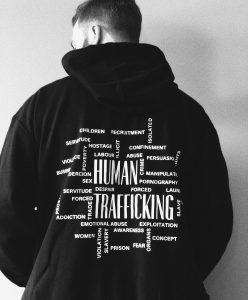HUGE PROBLEM | City gov't rolls out awareness campaign on human trafficking
AMONG the issues that have been relegated to the back burner since the global health pandemic struck in the past two years are Trafficking in Persons and Online Sexual Abuse and Exploitation of Children (OSAEC).

Jeanette Ampog, executive director of Talikala, a non-government organization helping women and children, said that the “call to highlight Human Trafficking and Sexual Exploitation as recurring problems in our community and the appropriate presentation of these issues be it the victims, perpetrators, and scenarios to the mass audience should be deemed necessary in order to spread awareness and project the real problem of the issues.”
This initiative runs parallel to the city's effort through the Integrated Gender and Development Division which has rolled out an awareness raising campaign to the 182 barangays since 2018.
Lorna Mandin, IGDD head, said that there remains a need to revisit the barangays and probably ask assistance from the Barangay Child Protection Council to prevent and monitor cases of trafficking. She said so far, four cases have already been filed in court.
Deputy Regional Prosecutor Barbara Mae Flores, in a media forum last Tuesday, underscored the need for media to report cases of trafficking with utmost sensitivity, adhering to ethical standards in the journalism profession. She said the importance of protecting the identity of the victims by not including personal information that is leading, should always be considered by journalists.
The Philippine Press Institute, the national organization of newspapers, has always maintained the importance of ethical, objective, evidence-based reporting on human trafficking, especially as the victims are mostly vulnerable sectors in society.
The country do not lack for laws on human trafficking. Atty. Thaddeus Tuburan, one of the speakers during the media forum, explained Republic Act 9208 or the Anti-Trafficking in Persons Act of 2003, as amended by RA 10364 also known as the Expanded Anti-Trafficking in Persons Act of 2012.
Tuburan said that there are three inter-related and interdependent elements for a situation to be considered trafficking in persons:
- ACTS – It involves the recruitment, obtaining, hiring, providing, offering, transportation, transfer, maintaining, harboring, or receipt of persons with or without the victim's consent or knowledge, within or across national borders;
- MEANS – It is committed by use of threat, or use of force, or other forms or coercion, abduction, fraud, deception, abuse of power or of position, taking advantage of the vulnerability of the person, or the giving or receiving of payments or benefits to achieve the consent of a person having control over another person; and
- PURPOSE – It is done for the purpose of exploitation or the prostitution of others or other forms of sexual exploitation, forced labor or services, slavery, involuntary servitude or the removal or sale of organs.
The media forum organized by Talikala, IGDD and the Philippine Information Agency with support of AWO and Save the Children, aimed to provide the media with the basic knowledge and clear understanding on the issues and situations of TIP and OSAEC and to encourage with the media in delivering current news, updates, or features trafficking.
Editor-in-Chief
This “Eyes on Trafficking” story is reprinted from its original online location.

ABOUT PBJ LEARNING
PBJ Learning is a leading provider of online human trafficking training, focusing on awareness and prevention education. Their interactive Human Trafficking Essentials online course is used worldwide to educate professionals and individuals how to recognize human trafficking and how to respond to potential victims. Learn on any web browser (even your mobile phone) at any time.
More stories like this can be found in your PBJ Learning Knowledge Vault.
EYES ON TRAFFICKING
This “Eyes on Trafficking” story is reprinted from its original online location.
ABOUT PBJ LEARNING
PBJ Learning is a leading provider of online human trafficking training, focusing on awareness and prevention education. Their interactive Human Trafficking Essentials online course is used worldwide to educate professionals and individuals how to recognize human trafficking and how to respond to potential victims. Learn on any web browser (even your mobile phone) at any time.
More stories like this can be found in your PBJ Learning Knowledge Vault.
